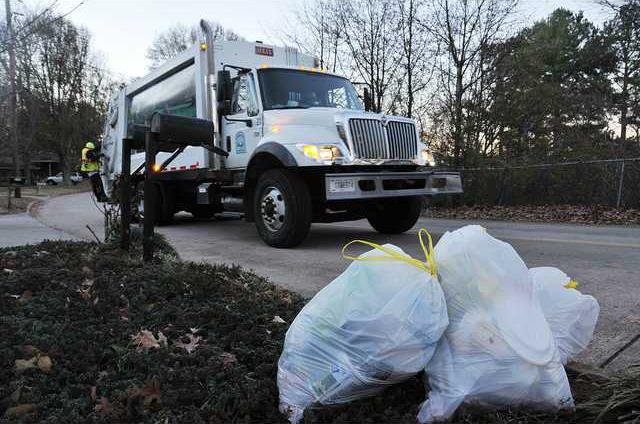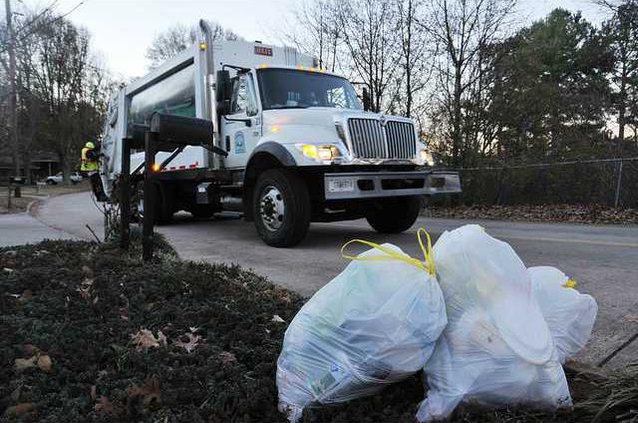Gainesville trash pickup changes
- Monthly fees have gone up $7 to $32.10.
- Each pickup is limited to 96 gallons.
- Trash must be in securely tied bags and in cans.
- Cans must be 10 feet from the house, visible from the driveway or at the curb.
- Cans may not be underground or in enclosures such as fences or garages.
- Trash should be ready for pickup at 7 a.m. on collection day.
As Gainesville residents wake up and get ready for the day, the city’s solid waste employees are already hard at work.
They slip onto the streets before dawn, lugging bags of trash down driveways and then lifting them into garbage trucks.
The 12 workers run three routes each morning, picking up bags from about 3,000 houses each day.
On Monday, the routine was a bit different as they noted which houses didn’t put trash in bags, bags in trash cans or cans in a visible place.
This week starts the new changes to Gainesville’s garbage service, which limits each pickup to 96 gallons, requires trash to be in bags and cans placed 10 feet from the house, and raises monthly fees by $7 to $32.10.
Workers are being lenient as the changes kick in, noting which houses have problems and handing out door hangers with the new rules. Next week, solid waste employees will start scheduling appointments with residents who continue to ignore the notes.
“We want to know what we need to do to work with people,” said solid waste supervisor Dan Owen, who circled the streets with his workers Monday morning to note any problems. “Walking away and leaving the garbage is not a viable option.”
If workers don’t pick up trash bags, even if they aren’t in compliance with the rules, residents could become confused and the trash build-up could attract
animals. A few residents already scheduled meetings at 8 a.m. and 8:30 a.m. Monday to talk about the changes.
“Most people are great and want to comply,” Owen said. “We’re just looking for help from everyone.”
Volume and location are the biggest concerns. Neighborhoods in Gainesville have “extremes,” Owen said, with some subdivisions in complete compliance and others that produce huge amounts of trash, don’t attempt to recycle and throw away unusual items, including car parts.
The solid waste workers often handle bags with broken glass, sharp needles and jagged soup can lids. Last week, one worker cut his arm on a broken car windshield tossed in a bag.
Robert Greenway, 59, drove one of the trash trucks Monday as Mark Crisco Jr. and Thomas Crosswhite hauled bags along Tower Heights Road and Lakeshore Drive.
“We’re looking forward to the changes, with all the walking and searching we do. I hope people recycle more, too,” said Greenway, who has worked for the solid waste department for 38 years. “Today has been about normal, but tomorrow is usually the roughest day, so we’ll see.”
The biggest problem? Informing as many residents as possible. At one stop, Crosswhite walked into a fenced area to find trash behind a house and Crisco picked up bags sitting in a front yard. At other homes, residents didn’t bother to tie the garbage bags.
Since 2000, $4 million has been transferred from the city’s general fund to the solid waste fund to support services, causing five rate increases. Talks to change the city’s trash policy started in 2009 when Gainesville City Council members charged the solid waste department with the need to become financially self-sufficient.
Owen looked at multiple options, including a “pay-as-you-throw” service that would bill users based on how much they throw away, which would have required residents to purchase special bags from local grocery stores.
After about a year of study, Owen proposed in March 2010 that the city move from its twice-weekly back door service — which is rarely seen in most Georgia cities — to the more common weekly curbside service.
“We take in about one-third less on the second day, but we still have to walk down every driveway and look in every trash can,” he said Monday. “We need to find a way to take care of the men who are walking up and down the driveways, and it puts wear and tear on the trucks.”
The council voted 4-1 in March to cut trash service to a weekly curbside pickup and take the current recycling service in-house, saving money by selling the recyclable material instead of paying $238,000 for the service each year.
City officials received a flood of e-mails and phone calls about the proposal, and council members decided to begin an eight-week pilot study in April to determine if the department could save money by switching to once-weekly trash pickup.
Owen told officials at the end of the study that the trucks were dumping the same amount each week at the landfill, but it took longer to complete each route and heavier loads strained employees. Though city workers placed notices at each door to notify residents, some didn’t understand when their trash would be collected.
Throughout the summer, council members held public hearings, and residents poured out to complain about the changes, fees and gallon limit. After debating the changes for months, the council passed the final solution in September.
Owen is worried some residents still don’t know services have changed. After solid waste workers handed out door hangers in December, the department received numerous phone calls from people who didn’t know about the fee increase or complained about the service changing at all.
“How hard should you be with people?” he said. “We need these changes to help our workers and be more efficient. Sometimes it’s like an Easter egg hunt trying to find those garbage bags.”

